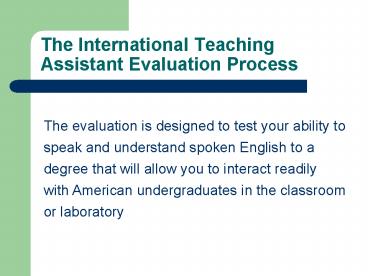The International Teaching Assistant Evaluation Process - PowerPoint PPT Presentation
1 / 16
Title:
The International Teaching Assistant Evaluation Process
Description:
You will spend time talking with two trained interviewers ... The questions will be in colloquial English, and the voices will be both male and female ... – PowerPoint PPT presentation
Number of Views:27
Avg rating:3.0/5.0
Title: The International Teaching Assistant Evaluation Process
1
The International Teaching Assistant Evaluation
Process
The evaluation is designed to test your ability
to speak and understand spoken English to a
degree that will allow you to interact readily
with American undergraduates in the classroom or
laboratory
2
The Evaluation Process
- The evaluation is composed of three parts
- An oral interview
- A listening dictation test
- A microteaching presentation
- The portions of the evaluation are given in this
order, and if you should score high enough on the
oral interview you need not do the rest.
3
The Oral Interview
- You will spend time talking with two trained
interviewers - They will simply have a conversation with you
the topic might be anything - Many students try not to talk much during the
interview to hide their accentthis is a bad idea - The key to scoring well on this part of the
evalu-ation is to be talkative and make eye
contact
4
The Oral Interview
- Remember that the interviewers are going to try
to assess how you will interact with
undergrad-uates from the US - With students it is often important that you
initiate a conversation, and you want to
demon-strate that you can do this in the
interview as welldont just react to what the
interviewers say - You will have a chance to practice this later
today
5
The Oral Interview
- The interview is scored on a 5-point scale
- If you get a 3 or better from both interviewers,
you may be eligible to teach - A score of 3 does not exempt you from further
evaluation - A score of 4 means that you are cleared for
teaching and need not participate further in the
evaluation
6
The Listening Dictation Test
- You will listen to twenty recorded questions that
are frequently asked by undergraduates at US
universities - The questions will be in colloquial English, and
the voices will be both male and female - You will hear each question only once
- After the question, you must write down what you
have heard
7
The Listening Dictation Test
- You must then write down an appropriate short
response to the question - There is no specific correct answer to any of
these questions, you need only write down an
answer that is appropriate - For example, a question might be What is the
policy on turning in homework assignments late?
8
The Listening Dictation Test
- To pass this section of the test, you must
comprehend at least 16 of the questions correctly
9
The Microteaching Presentation
- You will give a 10-minute presentation in which
you explain a principle or a central concept in
your field - You select your own topic, and present it as if
to an undergraduate audience with no significant
background in the field (its probably better to
do this at a high-school level) - The last 2-3 minutes of the presentation will be
devoted to questions
10
The Microteaching Presentation
- You must have at least six minutes of material
prepared - It is OK if you have too much material they will
stop you before you are done, but there is no
penalty for this - You will be rated by three different evaluators
both on your presentation and on answering their
questions
11
The Microteaching Presentation
- A score of 4 will allow you to teach
- We will talk in more detail about microteaching
tomorrow and will practice on Wednesday
12
The Evaluation Rating
- In effect there are three possible ratings
- Pass allows you to teach with no further
requirements - Conditional pass may allow you to teach, so long
as you also take an English class - Fail means that you must take English classes and
redo the ITA evaluation
13
The Recommended Placement
- Exempt means that you are done
- UME1006 is a course to help improve your
pronunciation of American English - UME1008 is a course to improve your listening,
fluency and communication skills - Other means that you may be required to take
additional courses
14
What if you dont pass?
There are TA positions that involve grading
rather than classroom or laboratory teaching. If
you do not pass you will most likely be assigned
to one of these positions.
15
Why pass, then?
- The English class(es) that you will have to take
if you do not pass will take up a lot of your
time and are not nearly as interesting as your
science classes - You will have to keep taking the evaluation until
you pass - You will have less time to devote to your other
classes and to choosing a research group
16
Your scheduled appointments
- If MEI has scheduled you for an event, you must
attend - This takes precedence over anything and
every-thing else - For this reason, much of the material for the
general orientation on Thursday and Friday is
being covered separately for you today - At times at which MEI has not scheduled you, do
attend relevant events at the general orientation































